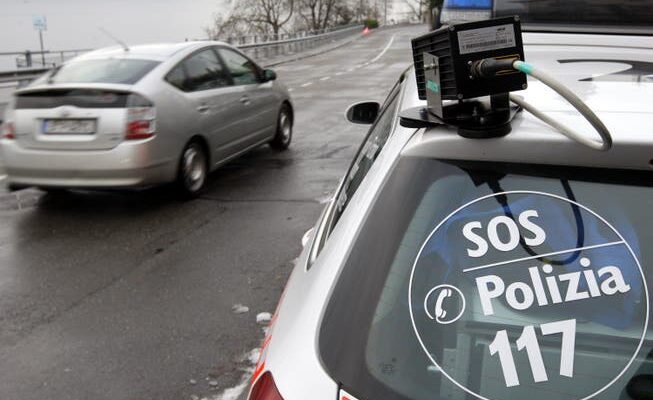Modern cameras can scan license plates in fractions of a second and access police databases. Many canton police want to record traffic offenders as completely as possible.
Automated vehicle search: To this day, it is controversial in which cases this form of surveillance is permissible at all.
Digital surveillance systems are becoming more and more important for the police – and not just for solving capital crimes. For years, the police corps have been expanding the automatic search for vehicles in order to be able to systematically punish traffic violations. Car numbers are scanned without the driver’s knowledge and recorded
An example from the canton of Aargau shows how the AVF works: Only residents are permitted to drive through a neighborhood street in a small community. But because it is a popular secret path, the Aargau police used an AVF camera there: as soon as a car turned into the street, the car number was recorded and with a
«The beginning of a surveillance state»
But a court stopped the practice a year ago. The AVF cameras had to be uninstalled pending legislation. Whether that will happen is an open question. There is great resistance to a corresponding amendment to the Police Act. The SVP warns of the “beginning of a surveillance state in Aargau”, as the “Aargauer Zeitung” recently reported. Even with the SP, which otherwise does not politicize in a particularly car-friendly manner, it sounds no different: the proposal leads to an expansion of surveillance and is an encroachment on civil liberties.
Thurgau is considered a pioneer in this field, where such systems were put into operation years ago. Various cantons have amended their police laws for this purpose or are planning to do so. However, the general public can hardly tell where which regulation applies. Because the cantons are responsible, the federal authorities do not know where such systems are used. It is therefore also unknown how many such cameras are used.
“Huge potential for abuse”
Court decisions similar to those in Aargau were also made in other cantons, for example in Basel-Stadt, where a motorcyclist was arrested by the police two years ago for illegal filming was acquitted of several traffic offences. For Monika Simmler, Professor of Criminal Law at the HSG, the use of AVF systems is tricky for several reasons. For years, Simmler has been dealing with the legal foundations of intelligent camera systems, such as those used to compare mug shots.
The AVF cannot be used where there is no legal basis in the cantons, says Simmler. But also in the other cantons, many aspects of data protection law in the area of AVF remained unresolved, such as the questions of which databases the police feed the data into or how they deal with the error rate inherent in the system. Simmler openly asks whether this general automated monitoring is justified at all, since the vast majority of road users obeyed the rules. In any case, the potential for abuse is huge.
Federal court orders cantons back
The Federal Supreme Court has long had to deal with the automated vehicle search – and some harsh criticism has come from there too. Three weeks ago it hit the canton of Solothurn, which had revised its police law just two years ago, not least for this reason. In a much-noticed judgment, the Federal Supreme Court overturned the AVF provision at the end of December – partly because the scope of application was too open and data protection was poorly formulated.
Not only the decision itself is remarkable, but also the urgency with which the Federal Supreme Court warns against excessive surveillance: In contrast to the work done by a police patrol, “the system enables the mass and practically unlimited collection and evaluation of data,” says the decision . The highest judges therefore describe the automated vehicle search as a serious “interference with the right to informational self-determination”.
No blank check for cantons
The judgment also makes it clear that complete surveillance on the street is not automatically justified even if there is a legal basis: instead, there must be sufficient reason for ordering the AVF: “This must protect legal assets or public interests of considerable importance serve weight.” The monitoring of neighborhood streets driving bans for unauthorized persons is unlikely to be included.
The court also draws attention to another problem: there is a risk that those affected by errors in the system will be wrongly suspected. The decision does not reveal where exactly the Federal Supreme Court sees the boundary between permitted and inadmissible number scanning. The systems also undeniably have many advantages, for example when it comes to tracking criminals or recovering stolen vehicles.
It is the second time in just a few years that the federal court has called back a canton. Three years ago, a driver from the canton of Thurgau was right when he was caught at the wheel using a license plate scanner, even though his driver’s license had been revoked. The message is clear: there is no such thing as a blank check for the police in this area.
